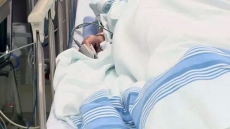VANCOUVER - British Columbia's human rights commissioner is urging policy-makers, employers, landlords and service providers to keep human rights principles at the core of their response to the COVID-19 pandemic.
"It's such a scary time and it's so important that we don't let our fear metastasize into discrimination," Kasari Govender said in an interview.
Her office recently released a policy statement focused on COVID-19 that's intended to provide guidance under the B.C. Human Rights Code to ensure an adherence to human rights protections.
It outlines specific advice, such as reminding landlords they cannot turn away an applicant, harass a tenant or evict someone who has or appears to have COVID-19.
It stipulates that employers must accommodate employees who are considered particularly vulnerable to the virus, including elderly or immuno-compromised people.
Landlords, employers and service providers are also prohibited from making decisions based on whether a person comes from or appears to come from a "COVID-19 hotspot," such as China or Italy.
Parents who need to care for their children because schools are closed cannot be discriminated against, and the statement notes that additional childcare needs are likely to disproportionately affect women and single parents.
"We must be vigilant about how racism, economic inequalities and classism, ableism, ageism and misogyny may all be factors in how people are treated and how people experience the pandemic," it reads.
The surest way to guard against discrimination during the pandemic is to ensure that policies are based on evidence, said Govender, adding that it's important to fight against misinformation and biased assumptions.
Her statement also recognizes that some people face fewer barriers than others when it comes to accessing support and following public health advice.
The pandemic is also exposing the extent to which people are falling through the cracks of Canada's social safety net, said Govender.
"This is an unprecedented time, so the cracks in our social systems are showing in unprecedented ways."
In particular, she said, it shows that homelessness is a "massive public health problem."
"When push comes to shove, we're able to support people. So, why don't we do that all the time?"
For people who have contracted COVID-19, the question is whether the disease classifies as a disability that's afforded protections under the Human Rights Code, said Govender.
There hasn't been enough time for the courts or the province's Human Rights Tribunal to weigh in, said Govender, but in her view, contracting COVID-19 "very much qualifies" as a disability.
She said the common cold doesn't qualify, but a more serious illness, such as HIV, does, in part because of the stigma attached to that virus and also to COVID-19.
There's a long history of stigma attached to infectious disease, said Kiffer Card, a specialist in social epidemiology at the school of public health and social policy at the University of Victoria.
The stigma attached to an illness often dovetails with other stereotypes associated with socio-economic status, ethnicity and sexual orientation, to name a few, said Card.
And COVID-19 has also stigmatized activities that are typically considered normal, like going to the park or walking with a friend, he said.
The pandemic has given rise to new social norms, such as the expectation that individuals protect themselves for the sake of protecting others, but that can be a challenge for those who are already vulnerable and under-served, said Card.
"I think this will highlight for people the importance of creating good health and social systems in the first place, so that when pandemics (and) challenges come, we're actually able to respond to them more effectively," he said.
There's also evidence that when a condition is stigmatized it can shape the way health providers interact with patients, said Card, noting that diabetes and obesity are laden with the expectation that patients could have avoided developing those conditions.
So, he said, it's important to develop public health messaging and care by engaging with people who have contracted COVID-19, rather than relying on potentially biased views of their circumstances and behaviour.

